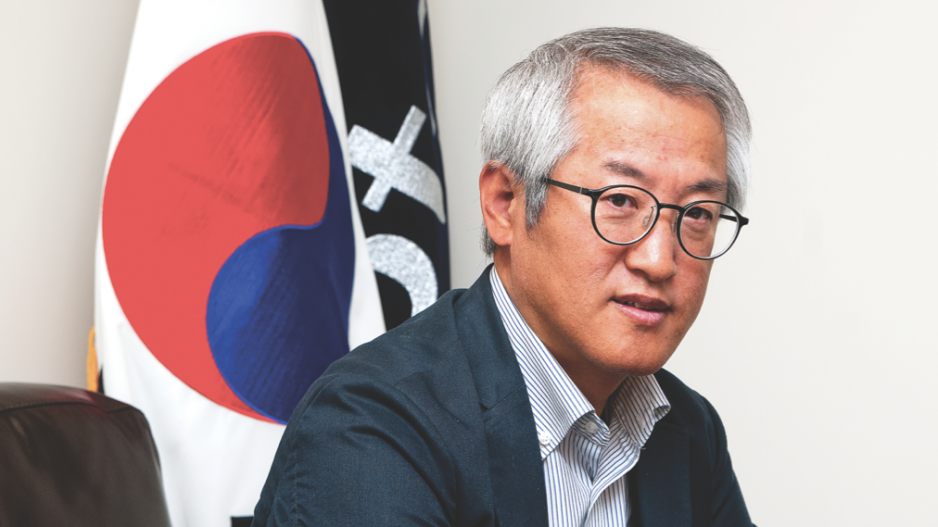After only one year on the job, South Korea’s top trade official in Western Canada has already made some significant inroads in boosting the Asian nation’s profile in Metro Vancouver – and he is far from being done.
Jung Hyung-shik, chief trade commissioner at the Vancouver office of the Korea Trade-Investment Promotion Agency (KOTRA), already has plans to boost the participation of Canadian and Korean companies significantly in KOTRA-sponsored trade events in the next year. This after a year in which KOTRA organized more than 30 events and trade shows drumming up business interest on both sides, often playing matchmaker to Canadian and Korean companies in industries ranging from food products to IT.
The former head of KOTRA’s service industry department at the organization’s Seoul headquarters is especially interested in promoting Korean films and pop culture in Metro Vancouver, bringing over a series of movies to local theatres.
Business in Vancouver sat down recently with Jung to discuss what he sees for Canada-South Korea trade relations, especially as the two-year-old free trade agreement between the two countries matures.
Q&A
Q: Your office has been heavily promoting movies like The Battleship Island in Vancouver. Why such focus on the movie and pop-culture industry?
A: Business is influenced by culture. The culture of a country is very important to trading. That’s why I’d like to introduce Korean movies and music to people in Vancouver, because they can then understand more about Korea – starting with Korean culture, and then with Korean products. In the last five years, the quality of Korean films and music has increased a lot, and at a very rapid pace. But I think most Canadians don’t understand how quickly the quality of these products has increased, so this is where we come in – to introduce these films and songs to Canadians, so that they can understand.
Q: Is there a challenge in introducing these films to Vancouverites? The local Korean population is not big, and the role of Koreans in Vancouver as cultural ambassadors may be limited.
A: The Korean population here is small, but Korea’s pop-culture products are already very popular in Asia, including China. With the large number of Chinese people in Vancouver, they already know how good our movies are. So when we introduce something here, Chinese people can accept it very easily, because they know the quality already. Canada is a multicultural society, with a lot of mixing happening all the time. So people exchange information among different groups very quickly, because there’s usually some cross-cultural links within someone’s friend or family networks. If a Chinese person accepts Korean culture, he or she can facilitate an easier entry of Korea culture into Canadian society.
Q: Since the free trade agreement came into force, Canada’s merchandise exports with South Korea have held steady at around $4 million in 2015, but Korean exports to Canada rose from $7.2 million to $8.2 million. How do you address the trade deficit?
A: The most important thing for me is to increase the trade volume on both sides, and not just for one side to see gains. It needs to be both sides, increasing together. I would like to support the balanced increase in trade, both from Canada to Korea and from Korea to Canada. We’d like to also see more people going in each direction. We’d like to see more Canadian business officials in Seoul, and we’d like to see more Korean business people here. We need to be closer as partners; a flight from Vancouver to Seoul takes 10 hours, but our minds, I hope, will be much closer than that. That’s how we can enhance both economies. Both sides enjoy the [Canada–South Korea Free Trade Agreement] since 2015, and year by year, I believe our relationship will become closer and closer.
Q: What are some of the industries you’ll be focused on this year?
A: We held an IT-industry forum in April, and we would like to expand the participation level for next year. We had 23 Korean companies this year … and we’d like to see maybe 40 companies next year, perhaps with more focus on high technology. In Korea and Vancouver, there are so many IT companies. The give-and-take of technological know-how, we can create something very special. So I think if we exchange our ideas about future technology and work together, we can go into markets like the United States or other countries together. I do think Vancouver is a good place for co-operation – perhaps better than the United States, given what’s happening with the Trump administration. I think a lot of talented people and companies may consider moving from places like San Francisco to Vancouver, and the city here already has a good foundation. By co-operating with Canadians here, I think we’ll have access to some very talented IT people who will end up here.
Q: Is it difficult to entice Canadian companies to work with South Korean counterparts, given that Korea doesn’t have as high a business profile as markets like China?
A: It’s not difficult to find the right companies to go to Korea; the challenge is that they don’t know about Korea. So we have to introduce our country and our businesses, and then the companies here would understand. Everyone’s heard of us, but no one knows us in-depth; our role is to explain our industrial landscape, so that the right companies would contact us later. Just last week, I met officials at Seaspan ULC [NYSE:SSW], and while they have no experience trading with Korean companies, they were very willing to connect. They’ve expressed they’d like to visit Korea in November, and that’s an example of the type of companies we are trying to find. Hopefully, once they go to Korea, they can find quality Korean suppliers so everyone can benefit. •




